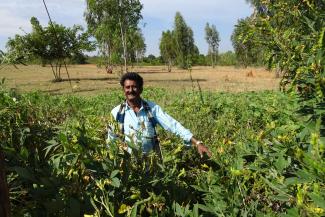Rural development
New opportunities for farmers

One of the main challenges India’s organic farmers face is that they are scattered and operate sporadically. They therefore struggle to market their products professionally. At the same time, demand for organically grown produce is growing, especially in urban areas such as Bangalore. Sahaja Organics builds a bridge between organic farmers and customers in the cities.
KfW Entwicklungsbank is promoting the effort with a loan worth the equivalent of around € 38,000. The loan was supplemented by a grant of around € 7,000 €, which was used to train and advise farmers and to organise marketing events.
Moreover, joint crop planning is carried out. It ensures that the farmers offer a broad variety of goods and prevents overproduction of a single good, which would then flood the market and make prices drop. Another strategy is to promote and market traditional plant varieties, which are also niche products in India. Sahaja preserves the seeds in a seed bank (see main article).
Sahaja Organics is the brand that is used by Sahaja Samrudha, a non-governmental organisation, which cooperates with the farmers at grassroots level. Sahaja Samrudha means bountiful nature. It aims to make the farmers more independent and resilient. Moreover, it wants to empower rural women, who are considered “the custodians of seeds”.
Thanks to Sahaja Organics, hundreds of farmers have gained access to the market, and many more have been encouraged to focus on the cultivation of organic products. Today, the Sahaja network includes 2,800 organic farmers in 20 producer groups spread over the south Indian state of Karnataka and parts of the neighbouring states Tamil Nadu, Kerala and Andhra Pradesh.
Before the introduction of hybrid seeds and industrial farming methods, agriculture in developing countries was always organic. According to Sahaja, the great challenge today is to modernise traditional farming methods in sustainable ways that improve farmers’ livelihoods in the long run. (sb)














